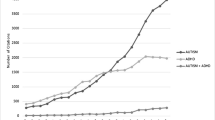Abstract
Tourette syndrome (TS) often presents with other comorbid conditions in clinical settings. The most common comorbidities are obsessive-compulsive disorder or obsessive-compulsive behaviors, attention deficit hyperactivity disorder, learning disabilities, autism, mood and anxiety disorders, and personality disorders. Comorbid disorders and coexistent psychopathologies are often associated with impaired functioning, more severe course, and poorer long-term outcome. The overall presentation of TS with and without comorbidities can be significantly different and comorbid neuropsychiatric conditions may also change with age. Thus, frequent reassessment of symptoms and re-ordering of treatment priorities are needed when following the child over the developmental timeline.
Similar content being viewed by others
References
Freeman RD, Fast DK, Burd L, Kerbeshian J, Robertson MM, Sandor P. An international perspective on Tourette syndrome: selected findings from 3,500 individuals in 22 countries. Dev Med Child Neurol. 2000;42:436–47.
Kurlan R, Como PG, Miller B, Palumbo D, Deeley C, Andresen EM, et al. The behavioral spectrum of tic disorders: a community-based study. Neurology. 2002;59:414–20.
Robertson MM. A personal 35 year perspective on Gilles de la Tourette syndrome: prevalence, phenomenology, comorbidities, and coexistent psychopathologies. Lancet Psychiatry. 2015;2:68–87.
American Psychiatric Association. Diagnostic and statistical manual of mental disorders, fifth edition ed. Washington, DC: American Psychiatric Press; 2013.
Robertson MM, Trimble MR, Lees AJ. The psychopathology of the Gilles de la Tourette syndrome. A phenomenological analysis. Br J Psychiatry. 1988;152:383–90.
Robertson MM, Banerjee S, Eapen V, Fox-Hiley P. Obsessive compulsive behaviour and depressive symptoms in young people with Tourette syndrome. A controlled study. Eur Child Adolesc Psychiatry. 2002;11:261–5.
Eapen V, Pauls DL, Robertson MM. Evidence for autosomal dominant transmission in Tourette’s syndrome. United Kingdom cohort study. Br J Psychiatry. 1993;162:593–6.
Eapen V, Robertson MM, Alsobrook JP 2nd, Pauls DL. Obsessive compulsive symptoms in Gilles de la Tourette syndrome and obsessive compulsive disorder: differences by diagnosis and family history. Am J Med Genet. 1997;74:432–8.
George MS, Trimble MR, Ring HA, Sallee FR, Robertson MM. Obsessions in obsessive-compulsive disorder with and without Gilles de la Tourette’s syndrome. Am J Psychiatry. 1993;150:93–7.
Cavanna AE, Monaco F, Mula M, Robertson MM, Critchley HD. Uneven focal shoe deterioration in Tourette syndrome. Neuropsychiatr Dis Treat. 2006;2:587–8.
Rothenberger A, Roessner V. The phenomenology of attention-deficit/hyperactivity disorder in Tourette syndrome. Tourette syndrome. New York: Oxford University Press; 2013.
Rizzo R, Curatolo P, Gulisano M, Virzi M, Arpino C, Robertson MM. Disentangling the effects of Tourette syndrome and attention deficit hyperactivity disorder on cognitive and behavioral phenotypes. Brain and Development. 2007;29:413–20.
Haddad AD, Umoh G, Bhatia V, Robertson MM. Adults with Tourette’s syndrome with and without attention deficit hyperactivity disorder. Acta Psychiatr Scand. 2009;120:299–307.
Byler DL, Chan L, Lehman E, Brown AD, Ahmad S, Berlin C. Tourette syndrome: a general pediatrician’s 35-year experience at a single center with follow-up in adulthood. Clin Pediatr (Phila). 2015;54:138–44.
Burd L, Freeman RD, Klug MG, Kerbeshian J. Tourette syndrome and learning disabilities. BMC Pediatr. 2005;5:34.
Baron-Cohen S, Scahill VL, Izaguirre J, Hornsey H, Robertson MM. The prevalence of Gilles de la Tourette syndrome in children and adolescents with autism: a large scale study. Psychol Med. 1999;29:1151–9.
Robertson MM. Mood disorders and Gilles de la Tourette’s syndrome: an update on prevalence, etiology, comorbidity, clinical associations, and implications. J Psychosom Res. 2006;61:349–58.
Cavanna AE, Robertson MM, Critchley HD. Schizotypal personality traits in Gilles de la Tourette syndrome. Acta Neurol Scand. 2007;116:385–91.
Ghosh D, Rajan PV, Das D, Datta P, Rothner AD, Erenberg G. Headache in children with Tourette syndrome. J Pediatr. 2012;161:303–7. e6
Author information
Authors and Affiliations
Corresponding author
Ethics declarations
Conflict of Interest
Raman Baweja and Debra Byler declare that they have no conflict of interest.
Human and Animal Rights and Informed Consent
This article does not contain any studies with human or animal subjects performed by any of the authors.
Funding Sources
None.
Rights and permissions
About this article
Cite this article
Baweja, R., Byler, D. Tourette’s Syndrome and Comorbid Neurological Condition. Curr Dev Disord Rep 4, 61–63 (2017). https://doi.org/10.1007/s40474-017-0113-2
Published:
Issue Date:
DOI: https://doi.org/10.1007/s40474-017-0113-2




